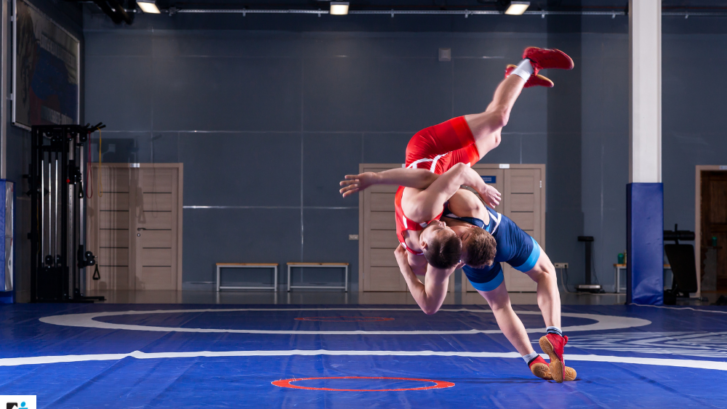Sports Injury Hall of Fame: Kurt Angle
The Road to the ’96 Olympics
When people think of Olympic heroes, people like Michael Phelps and Simone Biles often come to mind. But hidden within the history of American sports is a story that seems almost impossible. In 1996, Kurt Angle won the gold medal in wrestling. He did so while battling through a broken neck and grieving the loss of his mentor.
Humble Origins
Born and raised in Mount Lebanon, Pennsylvania, Kurt Angle was already a highly decorated wrestler long before the Olympics. As a two-time NCAA Division I champion at Clarion University, he earned a reputation for his limitless dedication. The 1996 Olympics represented the peak of everything he had been working for.
The Murder of Coach David Schultz
David Schultz was an accomplished wrestler and coach. He trained and taught at the Foxcatcher training facility in Newtown Square, Pennsylvania. He was pursuing a return to the Olympics and was mentoring members of the U.S. national wrestling team. There, he personally mentored Kurt Angle.
On January 26, 1996, Schultz was fatally shot by John du Pont, the wealthy founder and owner of the Foxcatcher estate. Du Pont had a history of erratic and troubling behavior, which had raised concerns long before the tragic incident. David Schultz was only 36 when he was murdered. The events of the Foxcatcher tragedy were documented in a 2014 film of the same name.
In the aftermath, his widow, Nancy Schultz, established the Dave Schultz Wrestling Club, offering displaced athletes from Team Foxcatcher a place to continue training and receiving coaching support through the 1996 Olympic season.
Angle’s Grief
“What’s crazy is I would train at Foxcatcher probably seven months a year,” Angle said in an interview with The True Geordie podcast. “Because it was in Pennsylvania. It was right down the road from me, a three or four-hour drive, so I would go there, and I would bounce back and forth from my hometown to Philadelphia, PA, where Foxcatcher was.”
Foxcatcher was an up and coming wrestling camp with significant financial backing from John Du Pont, and was home to innovative and new coaching strategies. It was a perfect place for a rising star like Kurt Angle – but the tragedy would loom over his Olympic journey.
“I called Dave [Schultz] the day that he got killed. I called him right around the time he got shot. [Then[ I left him a message on his answering machine, and I told him that I’m coming out the next day to train with him… [From there] I went to practice in Pittsburgh down at Duquesne University; it’s a college in the city of Pittsburgh… Afterward, I looked up at the TV, and I see on CNN, ‘Dave Schultz shot and murdered.”
This loss was insurmountable, and it sent Angle into a pit of doubt and worry about his own future amidst his grief.
In another interview, Kurt stated “Losing Dave was tough because, you know, I lost him [around] two months before the first round of the Olympic trials and the US open, and losing him was really tough. I didn’t know if I was going to be able to continue on without Dave because he had so much knowledge. And he’s always been my coach.”
Honoring Their Name
The loss of David Schultz was felt throughout the wrestling community, and his memory was immortalized on the road to the Olympics and at the ceremony itself. As one of America’s most highly decorated and respected athletes, his influence and memory was always present in Kurt’s training.
“I continued on, and dedicated the Olympics to Dave Schultz. He was an incredible person, a great coach, one of the greatest wrestlers of all time, and he taught me everything about wrestling. Schultz taught me positioning, technique, and how to carry myself… Dave was a leader, and he really led everybody in the Foxcatcher club… [After he died] I quit the club immediately, and Nancy Schultz, Dave’s wife, called me, and told me that she was starting the Dave Schultz wrestling club. [She asked] if I could be the first member, and I said yes right away… And I honored their name in the Olympics.”
The Injury That Could Have Ended Everything
With this tragedy present, the tone of Angle’s training had dramatically changed.
For many, the decision would have been to forego competing entirely, but he was set on making it to the Olympic stage.
The Road to Recovery
Angle underwent intense rehabilitation, managing his constant pain with a steady flow of cervical spine epidural injections and self-administered Novocain injections. Angle’s training was adjusted carefully to minimize the risk of further injury. Every day was a balancing act between pushing his limits and keeping his hope alive. In interviews, Angle has mentioned developing creeping doubts and fears ahead of the Olympics, but it wouldn’t be enough keep him from pursuing his dream.
The 1996 Games
When the Games finally arrived, Angle wasn’t just battling the world’s best wrestlers. He was fighting against his own body. Every match demanded intense focus, as he was constantly walking the line between victory and a career ending injury.
When Kurt stepped onto the Olympic mat in Atlanta, GA, he carried so much more than the hopes of the United States. He carried his broken neck, along with the memory and legacy of Coach Schultz. Every match was a war against his opponents and the horrible pain radiating from his neck through his body.
The Finals
For every round, he faced elite competitors from across the world. Angle’s technical precision allowed him to avoid risky moves that could agitate his neck.
In the gold medal match, Angle was set to face Abbas Jadidi of Iran, an incredibly formidable opponent. The match was brutally physical. After a brief deliberation, the judges awarded the victory, and the gold, to Kurt Angle.
Broken Neck: Unbreakable Dreams
“Nothing else mattered to me. If I would have died that night, I’d have been the happiest man in the world. I did what I set out to do, and that was to win the Olympic gold medal.”
Kurt Angle’s dedication to the craft and victory helps to tell the story of a man backed into a corner. From his grief over the loss of Coach Schultz, to his brutal neck injury, and all the way to winning the gold medal, Kurt Angle is truly one of the greatest underdogs to ever grace the Olympic stage. His triumph remains one of the most inspiring moments in sports history.
If you or a loved one are seriously injured while playing a contact sport, seek treatment immediately. To avoid serious injury and prolong your sports career, visit Healthpointe today.
Healthpointe specializes in physical healthcare, and we have an extensive roster of board certified physicians who are well suited to help with pain management. Our team can help assist you with prevention and treatment of a variety of ailments. Fill out this form to set up an appointment.
We also offer texting services! Give us a call or text us to schedule an appointment today at (714) 367-5390.
We have locations in Anaheim, Colton, Corona, Garden Grove, Irwindale, La Mirada, Long Beach, Los Angeles, Ontario, Perris, and Temecula.

